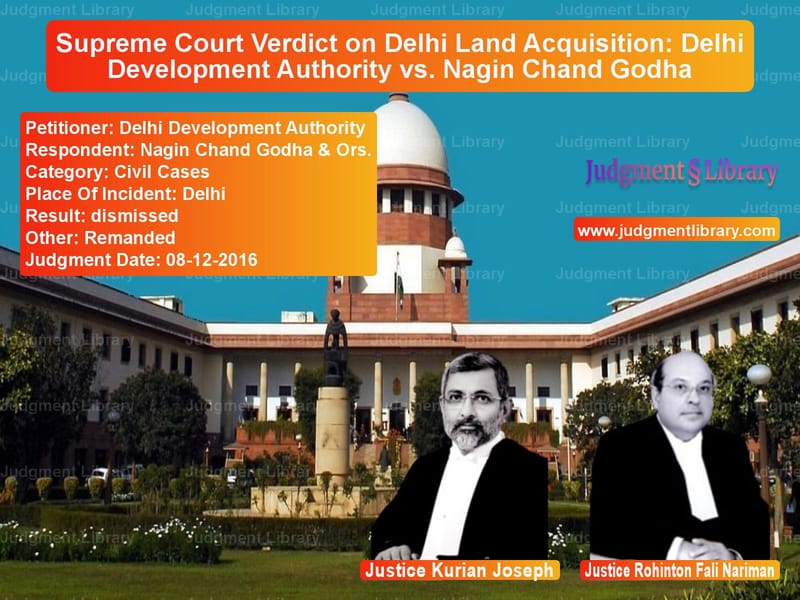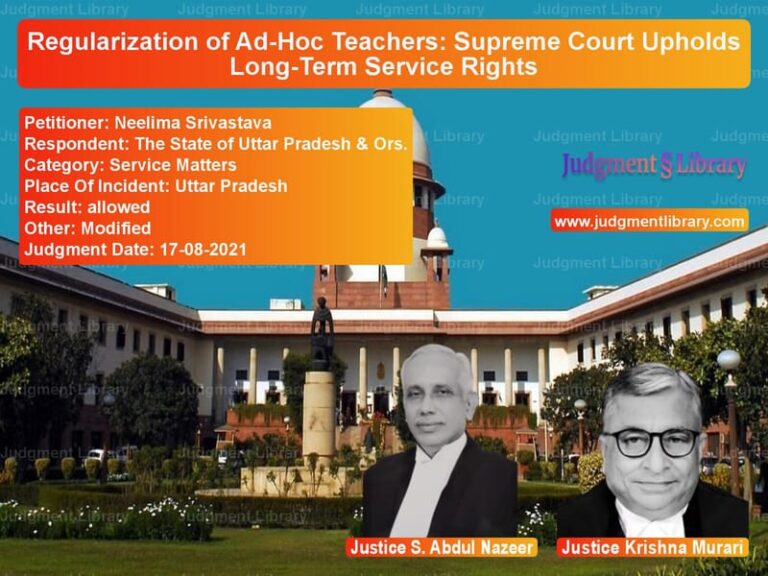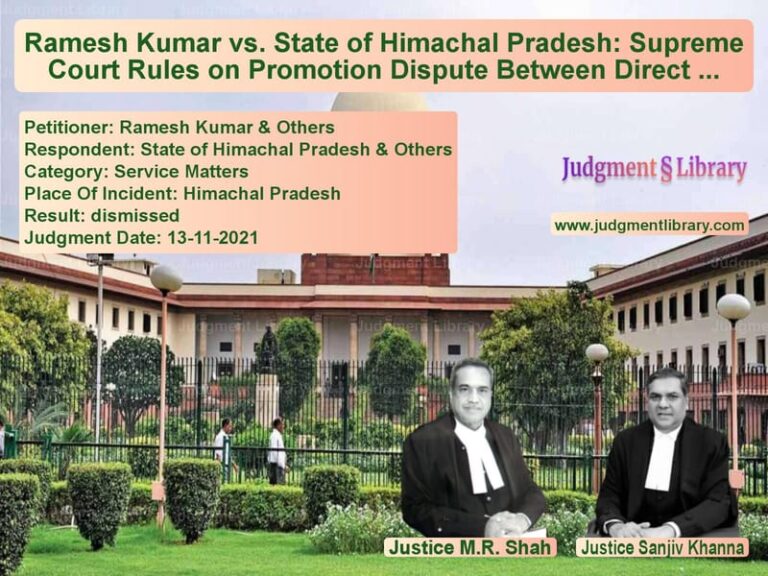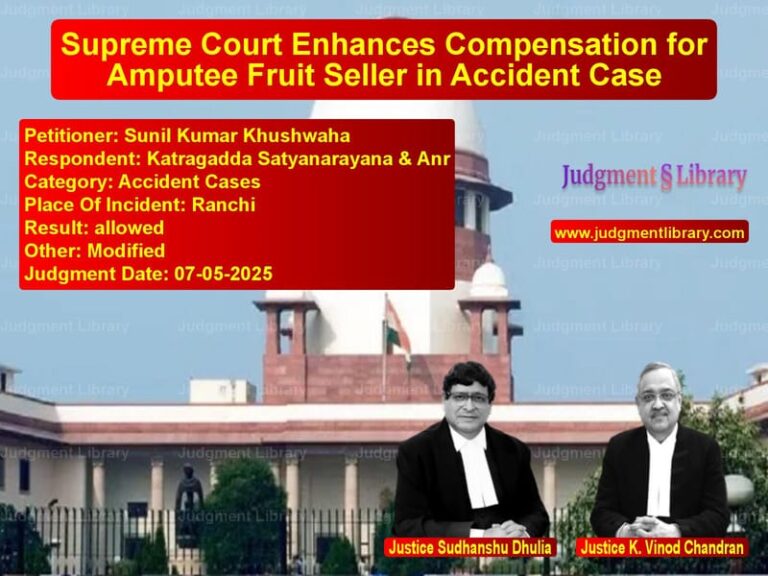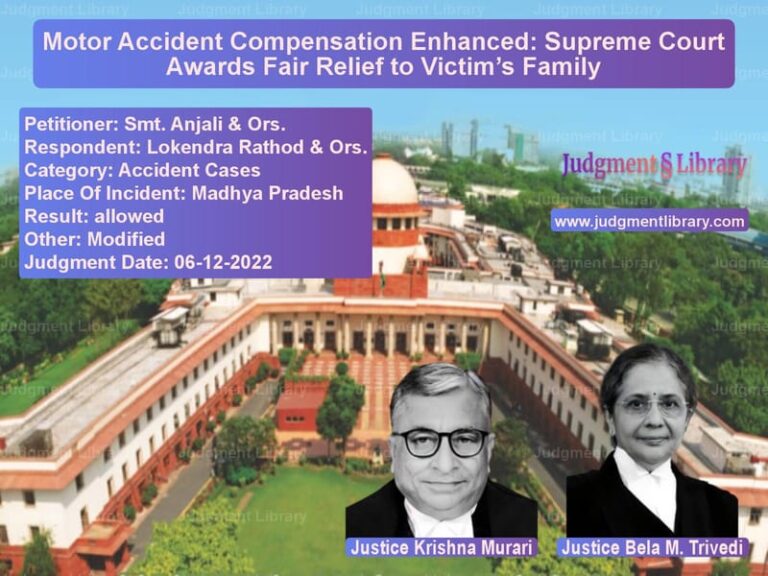Supreme Court Verdict on Delhi Land Acquisition: Delhi Development Authority vs. Nagin Chand Godha
The Supreme Court of India, in its judgment delivered on December 8, 2016, in the case of Delhi Development Authority (DDA) vs. Nagin Chand Godha & Ors., ruled on a contentious land acquisition matter. This case revolved around the applicability of the Right to Fair Compensation and Transparency in Land Acquisition, Rehabilitation and Resettlement Act, 2013 (LARR Act, 2013), the procedural failures of the Delhi Development Authority, and the legal rights of landowners.
Land acquisition has been one of the most controversial legal issues in India. The process by which the government or its agencies take over private land for public purposes has frequently led to disputes, especially regarding compensation, possession, and fair treatment. This case is significant in setting a precedent for protecting landowners’ rights and ensuring strict compliance with acquisition laws.
Background of the Case
The Delhi Development Authority (DDA) acquired land from private owners for development projects. However, the landowners challenged the acquisition, arguing that they had not received compensation as mandated by the law. They further claimed that since the DDA had not taken physical possession of the land, the acquisition process should be deemed void.
The lower courts ruled in favor of the landowners, holding that the acquisition was incomplete due to the failure of the DDA to meet its statutory obligations. Aggrieved by these decisions, the DDA appealed to the Supreme Court, seeking validation of the acquisition process.
Legal Issues Considered
- Did the acquisition proceedings comply with the LARR Act, 2013?
- Did the DDA fulfill its statutory obligations regarding compensation and possession?
- Were the landowners entitled to reclaim their land due to the non-compliance of the DDA?
- Could fresh acquisition proceedings be initiated?
Arguments of the Petitioner (Delhi Development Authority)
- The land was legally acquired following due process, and the DDA acted within its authority.
- The compensation process was delayed due to administrative reasons, but there was no deliberate attempt to deny compensation.
- Allowing landowners to reclaim the land would disrupt development projects and impact public interest.
- The High Court’s ruling failed to consider the complexities involved in large-scale urban development.
Arguments of the Respondent (Nagin Chand Godha & Ors.)
- The DDA failed to fulfill its obligations under the LARR Act, 2013, which explicitly mandates timely compensation and possession.
- The compensation had not been paid for several years, rendering the acquisition invalid under Section 24(2) of the LARR Act.
- The failure to complete the acquisition process resulted in undue hardship for the landowners.
- The government could not indefinitely hold onto land without fulfilling its legal obligations.
Supreme Court’s Judgment
The Supreme Court, comprising Justice Kurian Joseph and Justice Rohinton Fali Nariman, ruled against the DDA and made the following key observations:
- The case was covered by earlier judgments in similar land acquisition disputes.
- The appeal was dismissed, reinforcing the principle that failure to complete the acquisition process in accordance with the law results in the land reverting to the owners.
- The DDA was granted a one-year window to initiate fresh acquisition proceedings under the LARR Act, 2013.
- If the DDA failed to initiate fresh acquisition proceedings within a year, it would have to return physical possession of the land to the original owners.
Analysis of the Judgment
The ruling reaffirmed the importance of compliance with legal mandates in land acquisitions. The Supreme Court emphasized that administrative lapses should not result in hardship for landowners. It ruled that government agencies must complete the acquisition process within a reasonable timeframe, failing which, the acquisition may be invalidated.
The Court struck a balance by allowing the DDA one last opportunity to rectify its lapses while ensuring that landowners were not indefinitely deprived of their property rights.
Key Legal Takeaways
- Compliance with LARR Act, 2013: Government agencies must strictly adhere to statutory provisions while acquiring land.
- Landowners’ Rights: If acquisition conditions are not met, landowners have the right to reclaim their property.
- Judicial Oversight: Courts play a crucial role in ensuring fairness in land acquisition cases.
- Limited Time for Rectification: The ruling provided the DDA with a one-year window to correct its procedural lapses.
- Precedent for Future Cases: This judgment sets a significant precedent for similar disputes, reinforcing the need for strict compliance with acquisition laws.
Conclusion
The Supreme Court’s ruling in Delhi Development Authority vs. Nagin Chand Godha serves as a landmark judgment in land acquisition disputes. It reinforces the principle that government agencies must fulfill their legal obligations before taking possession of private land. The decision highlights the judiciary’s role in protecting landowners’ rights while providing authorities a fair chance to rectify administrative shortcomings.
By providing the DDA a limited timeframe to initiate fresh proceedings, the Court ensured that both development needs and property rights were respected. This judgment is expected to have significant implications for future land acquisition cases, ensuring that government agencies follow due process and uphold the principles of fairness and justice.
Don’t miss out on the full details! Download the complete judgment in PDF format below and gain valuable insights instantly!
Download Judgment: Delhi Development Au vs Nagin Chand Godha & Supreme Court of India Judgment Dated 08-12-2016.pdf
Direct Downlaod Judgment: Direct downlaod this Judgment
See all petitions in Property Disputes
See all petitions in Judgment by Kurian Joseph
See all petitions in Judgment by Rohinton Fali Nariman
See all petitions in dismissed
See all petitions in Remanded
See all petitions in supreme court of India judgments December 2016
See all petitions in 2016 judgments
See all posts in Civil Cases Category
See all allowed petitions in Civil Cases Category
See all Dismissed petitions in Civil Cases Category
See all partially allowed petitions in Civil Cases Category

